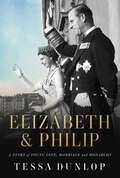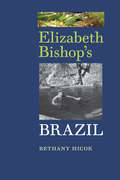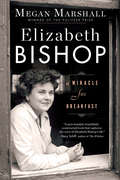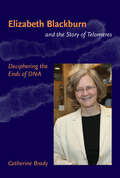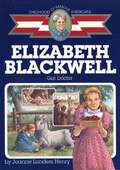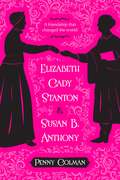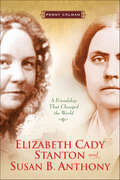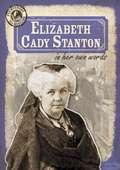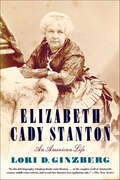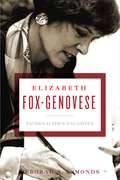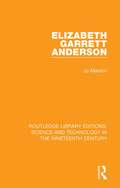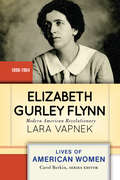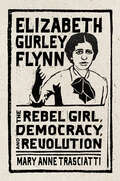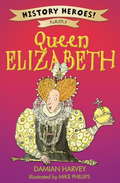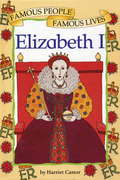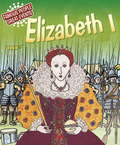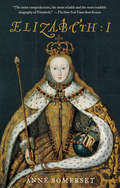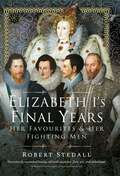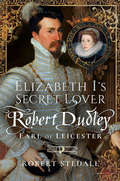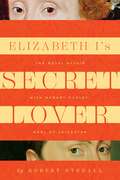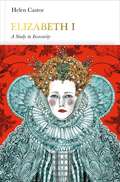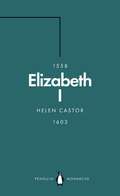- Table View
- List View
Elizabeth & Philip: A Story of Young Love, Marriage, and Monarchy
by Tessa DunlopThis deeply moving story explores the attractions—and the tensions—that defined the most extraordinary royal marriage of the past seventy-five years.She was peaches-and-cream innocence; he was a handsome war hero. Both had royal blood coursing through their veins. The marriage of Britain's Princess Elizabeth to Lieutenant Philip Mountbatten in November 1947 is remembered as the beginning of an extraordinary lifelong union, but their success was not guaranteed. Elizabeth and Philip: A Story of Young Love, Marriage, and Monarchy plunges the reader back into 1940s Britain, where a teenage princess fell in love with a foreign prince. There were fears of a flirtatious "Greek" fortune hunter stealing off with England's crown jewels—and then subsequent efforts by the Establishment to reframe Philip as the perfect fit for Britain's most famous family. Drawing on original archives as well as interviews with Elizabeth and Philip's contemporaries who are still alive today, historian Dr. Tessa Dunlop discovers a post-war world on the cusp of major change. Unprecedented opinion on Philip's suitability was a harbinger of pressures to come for a couple whose marriage was branded the ultimate global fairytale. Theirs was a partnership like no other. Six years after Elizabeth promised to be an obedient wife, Philip got down on bended knee and committed himself as the queen's "liege man of life and limb." This deeply touching history explores the ups and downs, as well as the attractions and the tensions, that defined an extraordinary relationship. The high stakes involved might have devoured a less committed pair—but not Elizabeth and Philip. They shared a common purpose, one higher even than marriage, with roots much deeper than young love. Happy and glorious, for better or for worse, they were heavily invested in a God-given mission. Monarchy was the magic word.
Elizabeth Bishop's Brazil
by Bethany HicokWhen the American poet Elizabeth Bishop arrived in Brazil in 1951 at the age of forty, she had not planned to stay, but her love affair with the Brazilian aristocrat Lota de Macedo Soares and with the country itself set her on another course, and Brazil became her home for nearly two decades. In this groundbreaking new study, Bethany Hicok offers Bishop’s readers the most comprehensive study to date on the transformative impact of Brazil on the poet’s life and art. Based on extensive archival research and travel, Elizabeth Bishop’s Brazil argues that the whole shape of Bishop’s writing career shifted in response to Brazil, taking on historical, political, linguistic, and cultural dimensions that would have been inconceivable without her immersion in this vibrant South American culture. Hicok reveals the mid-century Brazil that Bishop encountered--its extremes of wealth and poverty, its spectacular topography, its language, literature, and people--and examines the Brazilian class structures that placed Bishop and Macedo Soares at the center of the country’s political and cultural power brokers. We watch Bishop develop a political poetry of engagement against the backdrop of America’s Cold War policies and Brazil’s political revolutions. Hicok also offers the first comprehensive evaluation of Bishop’s translations of Brazilian writers and their influence on her own work. Drawing on archival sources that include Bishop’s unpublished travel writings and providing provocative new readings of the poetry, Elizabeth Bishop’s Brazil is a long-overdue exploration of a pivotal phase in this great poet’s life and work.
Elizabeth Bishop: A Miracle for Breakfast
by Megan MarshallA biography of the brilliant, award-winning poet by one of her former students, the Pulitzer Prize–winning author of Margaret Fuller. Since her death in 1979, Elizabeth Bishop, who published only one hundred poems in her lifetime, has become one of America&’s most revered poets. And yet she has never been fully understood as a woman and artist. Megan Marshall makes incisive and moving use of a newly discovered cache of Bishop&’s letters to reveal a much darker childhood than has been known, a secret affair, and the last chapter of her passionate romance with Brazilian modernist designer Lota de Macedo Soares. By alternating the narrative line of biography with brief passages of memoir, Megan Marshall, who studied with Bishop in her storied 1970s poetry workshop at Harvard, offers the reader an original and compelling glimpse of the ways poetry and biography, subject and biographer, are entwined.&“A shapely experiment, mixing memoir with biography…[Elizabeth Bishop] fuses sympathy with intelligence, sending us back to Bishop&’s marvelous poems.&”—The Wall Street Journal&“Marshall is a skilled reader who points out the telling echoes between Bishop&’s published and private writing. Her account is enriched by a cache of revelatory, recently discovered documents…Marshall&’s narrative is smooth and brisk: an impressive feat.&”—The New York Times Book Review
Elizabeth Blackburn and the Story of Telomeres: Deciphering the Ends of DNA (The\mit Press Ser.)
by Catherine BradyThe story of molecular biologist Elizabeth Blackburn and her groundbreaking research on telomeres and what it reveals about the resourceful opportunism that characterizes the best scientific thinking.Molecular biologist Elizabeth Blackburn—one of Time magazine's 100 “Most Influential People in the World” in 2007—made headlines in 2004 when she was dismissed from the President's Council on Bioethics after objecting to the council's call for a moratorium on stem cell research and protesting the suppression of relevant scientific evidence in its final report. But it is Blackburn's groundbreaking work on telomeric DNA, which launched the field of telomere research, that will have the more profound and long-lasting effect on science and society. In this compelling biography, Catherine Brady tells the story of Elizabeth Blackburn's life and work and the emergence of a new field of scientific research on the specialized ends of chromosomes and the enzyme, telomerase, that extends them. In the early stages of telomere research, telomerase, heralded as a potential cure for cancer and diseases related to aging, attracted the voracious interest of biotech companies. The surrounding hype succeeded in confusing the role of telemorase in extending the life of a cell with a mechanism that might extend the lifespan of an entire organism. In Brady's hands, Blackburn's story reveals much about the tension between pure and applied science, the politicking that makes research science such a competitive field, and the resourceful opportunism that characterizes the best scientific thinking.Brady describes the science accessibly and compellingly. She explores Blackburn's struggle to break down barriers in an elite, male-dominated profession, her role as a mentor to other women scientists (many of whom have made their mark in telomere research), and the collaborative nature of scientific work. This book gives us a vivid portrait of an exceptional woman and a new understanding of the combination of curiosity, imaginative speculation, and aesthetic delight that powers scientific discovery.
Elizabeth Blackwell: Girl Doctor
by Joanne Landers HenryThe life of the first woman doctor in the Unites States, who worked in England and America to open the field of medicine to women.
Elizabeth Cady Stanton and Susan B. Anthony: A Friendship That Changed the World
by Penny Colman<p>In the Spring of 1851 two women met on a street corner in Seneca Falls, New York—Elizabeth Cady Stanton, a thirty-five year old mother of four boys, and Susan B. Anthony, a thirty-one year old, unmarried, former school teacher. Immediately drawn to each other, they formed an everlasting and legendary friendship. Together they challenged entrenched beliefs, customs, and laws that oppressed women and spearheaded the fight to gain legal rights, including the right to vote despite fierce opposition, daunting conditions, scandalous entanglements and betrayal by their friends and allies. <p>Weaving events, quotations, personalities, and commentary into a page-turning narrative, Penny Colman tells this compelling story and vividly portrays the friendship between Elizabeth Cady Stanton and Susan B. Anthony, a friendship that changed history.</p>
Elizabeth Cady Stanton and Susan B. Anthony: A Friendship That Changed the World
by Penny ColmanWeaving events, quotations, personalities, and commentary into a page-turning narrative, Penny Colman's Elizabeth Cady Stanton and Susan B. Anthony vividly portrays a friendship that changed history. In the Spring of 1851 two women met on a street corner in Seneca Falls, New York—Elizabeth Cady Stanton, a thirty-five year old mother of four boys, and Susan B. Anthony, a thirty-one year old, unmarried, former school teacher. Immediately drawn to each other, they formed an everlasting and legendary friendship. Together they challenged entrenched beliefs, customs, and laws that oppressed women and spearheaded the fight to gain legal rights, including the right to vote despite fierce opposition, daunting conditions, scandalous entanglements and betrayal by their friends and allies.
Elizabeth Cady Stanton in Her Own Words
by Nicole SheaFor over 50 years, Elizabeth Cady Stanton was one of the most influential leaders of the women's rights movement of the 1800s. In this book, abundant with interesting photographs and images, readers are given a glimpse of Stanton's public and personal life through her own writings. Her friendship with Susan B. Anthony, work for the women's rights convention of 1848, and connection with the antislavery movement are especially highlighted. Sidebars and fact boxes offer more about this period in US and world history.
Elizabeth Cady Stanton: An American Life
by Lori D. GinzbergElizabeth Cady Stanton was a brilliant activist-intellectual. That nearly all of her ideas—that women are entitled to seek an education, to own property, to get a divorce, and to vote—are now commonplace is in large part because she worked tirelessly to extend the nation's promise of radical individualism to women.In this subtly crafted biography, the historian Lori D. Ginzberg narrates the life of a woman of great charm, enormous appetite, and extraordinary intellectual gifts who turned the limitations placed on women like herself into a universal philosophy of equal rights. Few could match Stanton's self-confidence; loving an argument, she rarely wavered in her assumption that she had won. But she was no secular saint, and her positions were not always on the side of the broadest possible conception of justice and social change. Elitism runs through Stanton's life and thought, defined most often by class, frequently by race, and always by intellect. Even her closest friends found her absolutism both thrilling and exasperating, for Stanton could be an excellent ally and a bothersome menace, sometimes simultaneously. At once critical and admiring, Ginzberg captures Stanton's ambiguous place in the world of reformers and intellectuals, describes how she changed the world, and suggests that Stanton left a mixed legacy that continues to haunt American feminism.
Elizabeth Fox-Genovese: Paternalism's Daughter
by Deborah A. SymondsIn her provocative politics, which confront us still with the complexities of left and right, and her constant search for her place in the world, Fox-Genovese’s story resonates more strongly than ever.
Elizabeth Garrett Anderson (Routledge Library Editions: Science and Technology in the Nineteenth Century #5)
by Jo MantonFirst published in 1965. In 1865, a woman first obtained a legal qualification in this country as physician and surgeon. Elizabeth Garrett surprised public opinion by the calm obstinacy with which she fought for her own medical education and that of the young women who followed her. This full biography is based largely on unpublished material from the hospitals and medical schools where Elizabeth Garrett Anderson worked, and the private papers of the Garrett and Anderson families. This title will be of great interest to history of science students.
Elizabeth Gurley Flynn: The Rebel Girl, Democracy, and Revolution (CERES: Rutgers Studies in History)
by Mary Anne TrasciattiElizabeth Gurley Flynn was involved in almost every major campaign of the U.S. Left in the first two thirds of the twentieth century. An outstanding orator, writer, and tactician, Flynn is one of the most important figures in the history of the American labor movement. Inspired by the Irish freedom struggle and appalled by the exploitation and grinding poverty she saw around her, she devoted her life to the advancement of civil liberties. Here, Mary Anne Trasciatti traces Flynn’s personal and political life to explore the broader social issues of a fraught era. Born in 1890, Flynn began her activist career by joining the Industrial Workers of the World (IWW) when she was just sixteen, and she ended it as the first female chair of the American Communist Party, a position she held from 1961 until her death in 1964. In the intervening years she organized workers into unions, led strikes, championed women’s rights, supported anti-imperialist movements around the globe, protested deportation, advocated for prison reform, and fought for Black liberation. Above all, she showed absolute devotion to workers and their struggles. Slandered as an “un-American” in the anticommunist fervor of the 1940s and 1950s, Flynn was eventually ousted from the very organization she helped found, the American Civil Liberties Union, and imprisoned for two years. Though her own movement abandoned her, her commitment to the cause never wavered. This stirring biography illuminates Flynn’s inspiring life and worldview and returns her to her rightful place at the heart of labor and civil liberties history.
Elizabeth I
by Rupert Van Wyk Damian HarveyElizabeth I ruled during a turbulent time in Tudor history. Find out about her highs and lows from being imprisoned in the Tower of London to inspiring victory over the Spanish Armada. Discover the stories of people who have helped to shape history, ranging from early explorers such as Christopher Columbus to more modern figures like Tim Berners-Lee, inventor of the World Wide Web. These chapter books combine historical fact with engaging narrative and humourous illustration, perfect for the newly independent reader.
Elizabeth I
by Wallace T. MaccaffreyIn this major biography, MacCaffrey focuses on Elizabeth's career as a practicing politician, taking into account her formative personal experiences, her temperament, her own view of her role, and the constraints she frequently faced.
Elizabeth I (Famous People, Famous Lives #11)
by Harriet CastorExciting stories about famous people, outlining their lives and the important events which made them memorable. Every page features easy-to-follow text and a black-and-white line drawing to help bring these events to life. Each title gives further facts about the famous person and the times in which he or she lived, plus a comprehensive time line detailing key dates. When Elizabeth I becomes queen, she is determined to be a great Tudor queen - and do it on her own! She rules for almost 45 years, beats the Spanish Armada and wins the love of her people. Find out all about the life of Elizabeth I with this story that is packed with all the facts.
Elizabeth I (Famous People, Great Events #3)
by Harriet CastorWhen Elizabeth I becomes queen, she is determined to be a great Tudor queen - and do it on her own! She rules for almost 45 years, beats the Spanish Armada and wins the love of her people. Find out all about the life of Elizabeth I with this story that is packed with all the facts and colourful pictures.This book is part of a series of picture books, Famous People, Great Events, which are suitable for ages 6-12. They tell the stories of famous men and women and great events in history and can be used to study the primary history curriculum. Written by successful authors, they are enjoyable reads which are packed with facts and colourful illustrations.
Elizabeth I (History Heroes #3)
by Damian HarveyElizabeth I ruled during a turbulent time in Tudor history. Find out about her highs and lows from being imprisoned in the Tower of London to inspiring victory over the Spanish Armada.Discover the stories of people who have helped to shape history, ranging from early explorers such as Christopher Columbus to more modern figures like Tim Berners-Lee, inventor of the World Wide Web.These chapter books combine historical fact with engaging narrative and humourous illustration, perfect for the newly independent reader.
Elizabeth I (Women In History Ser.)
by Anne SomersetGlitteringly detailed and engagingly written, the magisterial Elizabeth I brings to vivid life the golden age of sixteenth-century England and the uniquely fascinating monarch who presided over it. A woman of intellect and presence, Elizabeth was the object of extravagant adoration by her contemporaries. She firmly believed in the divine providence of her sovereignty and exercised supreme authority over the intrigue-laden Tudor court and Elizabethan England at large. Brilliant, mercurial, seductive, and maddening, an inspiration to artists and adventurers and the subject of vicious speculation over her choice not to marry, Elizabeth became the most powerful ruler of her time. Anne Somerset has immortalized her in this splendidly illuminating account.From the Trade Paperback edition.
Elizabeth I's Final Years: Her Favourites & Her Fighting Men
by Robert StedallElizabeth I's Final Years outlines the interwoven relationships and rivalries between politicians and courtiers surrounding England’s omnipotent queen in the years following the death in 1588 of the Earl of Leicester. Elizabeth now surrounded herself with magnetically attractive younger men with the courtly graces to provide her with what Alison Weir has called ‘an eroticised political relationship’. With these ‘favourites’ holding sway at court, they saw personal bravery in the tiltyard or on military exploits as their means to political authority. They failed to appreciate that the parsimonious queen would always resist military aggression and resolutely backed her meticulously cautious advisors, William Cecil, Lord Burghley, and later his son Robert. With its access to New World treasure, it was Spain who threatened the fragile balance of power in Continental Europe. With English military intervention becoming inevitable, the Cecils diverted the likes of Walter Raleigh and the Earl of Essex, despite their lack of military experience, away from the limelight at court into colonial and military expeditions, leaving them just short of the resources needed for success. The favourites’ promotions caused friction when seasoned soldiers, like Sir Francis Vere with his unparalleled military record in the Low Countries, were left in subordinate roles. When Spanish support for rebellion in Ireland threatened English security, Robert Cecil encouraged Elizabeth to send Essex, knowing that high command was beyond his capabilities. Essex retorted by rebelling against Cecil’s government, for which he lost his head. Both Elizabeth and Cecil realised that only the bookish Lord Mountjoy, another favourite, had the military acumen to resolve the Irish crisis, but his mistress, Essex’s sister, the incomparable Penelope Rich, was mired by involvement in her brother’s conspiracy. Despite this, Cecil gave Mountjoy unstinting support, biding his time to tarnish his name with James I, as he did against Raleigh and his other political foes.
Elizabeth I's Secret Lover: Robert Dudley, Earl of Leicester
by Robert StedallThis biography details how one man rose to prominence in the Elizabethan court and become the queen’s favorite in more ways than one.Elizabeth I’s Secret Lover details just how Lord Robert Dudley become one of the most influential figures of his time. As a great impresario, he showed Elizabeth I off to her people to glittering effect and became the forerunner of Shakespearian theatre, combining classicism with ribaldry. He attracted the financing of Drake’s circumnavigation. He was the supporter of academic endeavor, of poetry, and of Puritan scholarship. By employing a network of his own agents, he provided information of crucial importance to Government. He built some of the finest houses and gardens of the age. As Master of the Horse, he developed English bloodstock to provide horses for Royal and military requirements. He even saw to it that England’s navy and army was properly prepared to meet Continental aggression when needed.Dudley also has faced criticism from historians by competing with William Cecil to gain the ear of Elizabeth I and thwarting his efforts to arrange a political marriage for her to protect against Continental Catholic aggression. There can be no doubt that Elizabeth wanted to marry him. He was devastatingly attractive, athletic, and loyal, and, as this book shows, there is compelling evidence that the “virgin queen” spent time in bed with him.“A well-researched account of their complicated relationship. If you finished Hilary Mantel’s The Mirror and the Light and are wondering what happened next to the blood-drenched Tudor clan, this could be the book for you.” —Mary Ann Gwinn, Minneapolis Star Tribune
Elizabeth I's Secret Lover: The Royal Affair with Robert Dudley, Earl of Leicester
by Robert StedallThis eloquent biography of the most influential nobleman of the Elizabethan Age reveals how Robert Dudley brilliantly captivated the court of Elizabeth I—and the heart of a queen.In many respects Lord Robert Dudley, Earl of Leicester, was the most significant statesman of the Elizabethan Age, ranking only behind the queen herself in precedence. As a great impresario, he honored Elizabeth I to glittering effect and became the forerunner of Shakespearean theater, combining classicism with ribaldry. He attracted the financing of Francis Drake&’s circumnavigation. He was the supporter of academic endeavor, of poetry, and of Puritan scholarship. By employing a network of his own secret agents, he provided information of crucial importance to the crown. As Master of the Horse, he developed English bloodstock to provide horses for royal and military requirements. He saw to it that England&’s navy and army was properly prepared to meet Continental aggression when needed. Lord Robert Dudley has faced criticism from historians by competing with William Cecil to gain the ear of Elizabeth I and thwarting his efforts to arrange a political marriage for her to protect against Catholic aggression from Spain. There can be no doubt that Elizabeth wanted to marry him. He was devastatingly attractive, athletic, and loyal. Perhaps most compelling to readers who enjoy royal scandal, this eloquent new book provides compelling evidence that the virgin queen spent time in her bed with him.
Elizabeth I, the People's Queen: Her Life and Times, 21 Activities
by Kerrie HollihanOne of England's most fascinating monarchs is brought to life in this hands-on study for young minds. Combining projects, pictures, and sidebars with an authoritative biography, children will develop an understanding of the Reformation, Shakespearean England, and how Elizabeth's 45-year reign set the stage for the English Renaissance and marshaled her country into a chief military power. Providing 21 activities, from singing a madrigal and growing a knot garden to creating a period costume--complete with a neck ruff and a cloak for the queen's court--readers will experience a sliver of life in the Elizabethan age. For those who wish to delve deeper, a time line, online resources, and a reading list are included to aid in further study.
Elizabeth I: A Study In Insecurity
by Helen CastorPart of the Penguin Monarchs series: short, fresh, expert accounts of England's rulers in a collectible format In the popular imagination, as in her portraits, Elizabeth I is the image of monarchical power. The Virgin Queen ruled over a Golden Age: the Spanish Armada was defeated; English explorers reached the ends of the earth; a new Church of England rose from the ashes of past conflict; the English Renaissance bloomed in the genius of Shakespeare, Spenser and Sidney. But the image is also armour. In this illuminating new account of Elizabeth's reign, Helen Castor shows how England's iconic queen was shaped by profound and enduring insecurity-an insecurity which was both a matter of practical political reality and personal psychology. From her precarious upbringing at the whim of a brutal, capricious father and her perilous accession after his death, to the religious division that marred her state and the failure to marry that threatened her line, Elizabeth lived under constant threat. But, facing down her enemies with a compellingly inscrutable public persona, the last and greatest of the Tudor monarchs would become a timeless, fearless queen.
Elizabeth I: A Study in Insecurity (Penguin Monarchs)
by Helen Castor'The experience of insecurity, it turned out, would shape one of the most remarkable monarchs in England's history' In the popular imagination, as in her portraits, Elizabeth I is the image of monarchical power. But this image is as much armour as a reflection of the truth. In this illuminating account of England's iconic queen, Helen Castor reveals her reign as shaped by a profound and enduring insecurity that was a matter of both practical politics and personal psychology.
